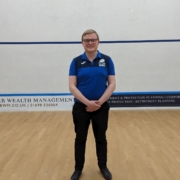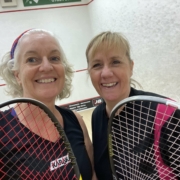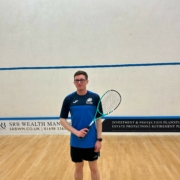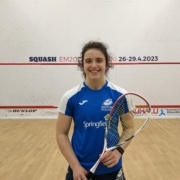Squash the Stigma: “It can feel like the whole world is against you”
Squash at the highest level can bring a lot of pressure to those in the spotlight.
Players give their all on court, with appreciative eyes watching their every move and every shot.
Just off court, in a prime seat, is an individual whose role in the match is just as important, but not always appreciated.
The referee.
Steffan Gwyn is one of the individuals that plays this role, with the 28-year-old referee having worked his way up the ranks to referee at the highest level in Scotland and in recent years, Europe.
The referee’s chair can be a lonely one, with players often not in agreement with decisions made, and spectators often in agreement with those on court.
Steffan reflects: “It can feel like the whole world is against you.
“I’ve had some big matches where it’s just me sat in the front row, and everyone was disagreeing with every decision that I made.
“That can feel a bit daunting, but trusting yourself is such a huge part of it.”
One of the young referee’s highlights was officiating the Scottish National Final between Rory Stewart and Greg Lobban in 2022.
While he loves being involved with games like these, he acknowledges that they can take a mental toll.
Steffan said: “I can be filled with anxiety before a big game, but once I get to the match, I can let it go and just focus on the match.
“After the match, you think back to decisions you’ve made and things you’ve said, and think I wish I hadn’t said that.
“That can play on my mind quite a lot for a few days after the game.”
When faced with high pressure matches, the Welsh-born official has created some routines which help him to be at his best, while looking after his own mental health and wellbeing.
He has found these routines to be transferrable to his life outside of squash, including before successfully defending his PhD thesis.
Steffan said: “It’s all about getting in the right mental frame of mind, so making sure that you get to sleep early.
“In the build-up to a game I sometimes get to the point where I don’t want to eat, but chatting to other people, talking about how we’re feeling and having that support network is so important.”
After a game, feelings of doubt can set in, even when he has been confident about the decisions he has made.
He reflects: “I always feel that uncertainty after a tricky game – I’ve had that feeling many, many times.
“If there has been some conflict I will take myself away, get a glass of water and just take some time to reflect.”
And the young official is keen for players and referees to work together to build a shared relationship and respect, to benefit both parties.
He said: “We need to build a relationship where everybody sees each other as people who can make mistakes.
“The players can hit the tin, the referee can make a bad decision, and that’s okay.
“That’s the message we are keen to get across.”
As part of our Squash the Stigma campaign, we are encouraging members of Scotland’s squash community to anonymously share their own squash related mental health stories. We will share some of these on social media as part of the campaign. If you would like to share yours, click here.








